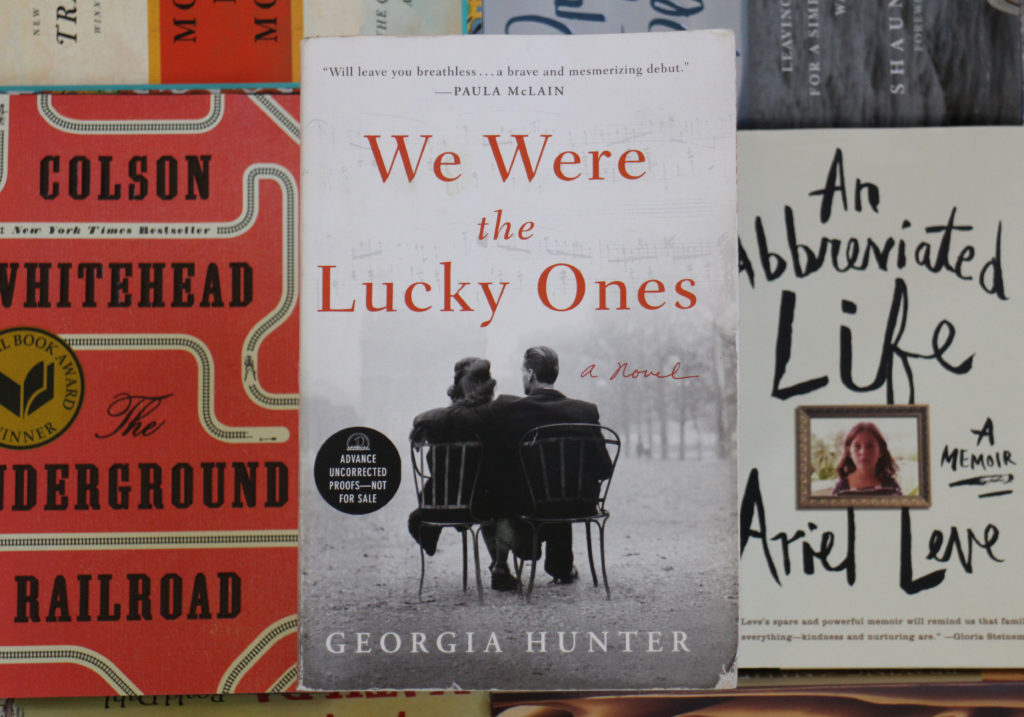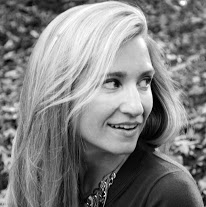
Brace yourself. I am about to introduce you to the next big thing in literature, Georgia Hunter. Her first novel, We Were the Lucky Ones, is already receiving fantastic reviews. And having read an advanced proof I can tell you first hand that is is exquisitely written and heartbreakingly good. It took Georgia almost a decade to write this book as she delved into her family’s history during World War II. It was not until Georgia was in her late teens that she discovered she was a direct descendant of Holocaust survivors. She left no stone unturned as she traveled from country to country piecing together the facts that would eventually become one story beautifully told through the eyes of many members of her family. Georgia takes you back in time and the reader can’t help but get lost in the cityscapes she brings to life in each chapter. As most World War II stories do, this one brings you to tears. But what makes this one so special is the unique way in which the author follows multiple plot lines that come back together in an emotional climax after the war ends. Well done Ms. Hunter. You are a beautiful writer.
To hear Georgia speak about her writing process you can head to the Chappaqua Public Library at 195 South Greeley Avenue on Tuesday, April 4 at 7:00 pm. She will be speaking live on the “Anything Goes” Kim Berns radio show on Thursday, March 30th around 11:30am. Below is more about the process in the author’s own words.
Q&A with Georgia Hunter, author of We Were the Lucky Ones
Why did you write this book?
I was fifteen years old when I learned, thanks to a high school research assignment, that I was a quarter Jewish, and that I came from a family of Holocaust survivors. I think because I grew up unaware of this piece of my heritage, the discovery sparked an incredible sense of curiosity, and an insatiable thirst for answers. When snippets of the Kurcs’ WWII experience surfaced again at a family reunion (I was 21), I realized ours was a story unlike any I’d ever heard before—a story, I decided, that needed to be told.
How long did it take you to write it, and how did you do your research about this incredibly devastating time in our history?
It took me almost a decade to research and write We Were the Lucky Ones. I flew to Paris in 2008 for my first interview, and soon after to Rio de Janeiro and across the States, meeting with cousins and friends—anyone with an oral history to share. My family’s narrative took shape, at first, in the form of a timeline, which I peppered with historical details and color-coded by relative to help keep track of who was where/when. Where there were gaps, I looked to outside resources—to archives, museums, and magistrates around the world, amazed at how much relevant information I was able to unearth. It was difficult, immersing myself for so long in such a dark period in history, but I reminded myself often that the Kurcs’ was a story a hope, and with every finding I was inspired to keep at it.
What did you grow up thinking was your family story?
I grew up a mile from my grandparents, so it’s strange, looking back, to think about how little I knew of my grandfather’s past. To me, he was Eddy Courts (the name he chose when he moved to the States), not Addy Kurc (the name he was born with). I never detected a Polish accent, or heard him talk about growing up Jewish in Radom—I assumed he was born an American. What I did know was that my grandfather was resourceful (he built many of the things in his home by hand), that he was a problem-solver, a composer, a stickler for grammar, a polyglot—things I might attribute now to his European-ness or to his Holocaust-era experiences, but that at the time I thought little of. I was far more consumed growing up (as many kids are, I think) with things like school and sports than with my ancestral past.
What did your research reveal?
One of the biggest takeaways from my research was the scope of my family’s story. I had no idea going into this project just how scattered my relatives were during and after the war. I was surprised to learn that their paths to survival spanned five continents—a finding that would prompt me to write the book from multiple perspectives. I was also struck in my research by the fact that while the Kurcs were living in extreme danger and despair, they also somehow managed to hold onto small semblances of their old lives. They were making music. Falling in love. Babies were born. I tried to balance the horrific experiences with moments of hope and laughter and love, as these were the things, I imagined, my relatives must have relied upon to carry on day after day.
What is the hardest part about writing a novel?
The hardest part was the patience it required. My family history was complicated and remote; it required years to unearth. Whether traveling to collect interviews or waiting for outside records (sometimes it took up to a year to get a response from a query), I had to remind myself constantly not to feel overwhelmed or discouraged, but to appreciate each step forward, however small. It was also a challenge, once the “bones” of my narrative had been collected, to decide how best to bring the story to life. I wanted for my readers to step into the shoes of my relatives, to understand what it would have meant to be Jewish and on the run during the Second World War. I worked hard to craft the book in a way that felt less like a history lesson and more human, visceral, and relevant.
How did your family feel about the book when it was finished?
My relatives have been incredibly (incredibly!) supportive of this project, from day one. Whether welcoming me into their homes for hours of conversation, trekking around town to find an old address, or hunting down and translating records at city archives, We Were the Lucky Ones would never have come to be without their help and constant encouragement. And thankfully, they have all reacted to the book (in its final form) with glowing reviews and overwhelming gratitude. Amazingly, over twenty family members (from Brazil, France, and across the States) attended my New York City launch event in February—I can’t tell you how incredible it felt to talk about the book for the first time with them in the audience!
What’s next for Georgia Hunter?
At the moment I’m consumed with a book tour and come summer, I’ll have my hands full with our second-born, due to arrive at the end of May! That said I have several ideas for book #2, which I’m excited to flush out this fall. I love the historical fiction genre and I’m inspired (as you may have gathered) by stories that revolve around an underdog protagonist—someone faced with terrible odds, whose narrative offers not only a big-picture understanding of a particular place or time in history, but also a lesson in courage, perseverance, and love. I just saw the film Lion and left the theater teary-eyed and thinking WOW—now that’s exactly the kind of story I want to write about next.


[…] Brace yourself. I am about to introduce you to the next big thing in literature, Georgia Hunter. Her first novel, We Were the Lucky Ones, is already receiving fantastic reviews. And having read an advanced proof I can tell you first hand that is is exquisitely written and heartbreakingly good. It took Georgia almost a decade to write this book as she delved into her family’s history during World War II… –Lindley Pless of The Sentimentalist […]